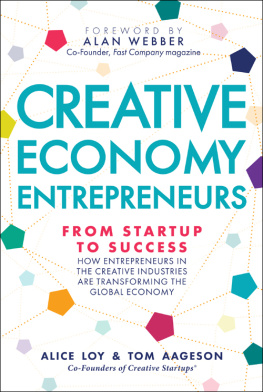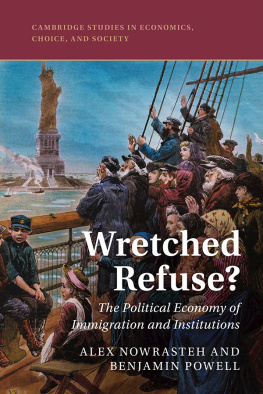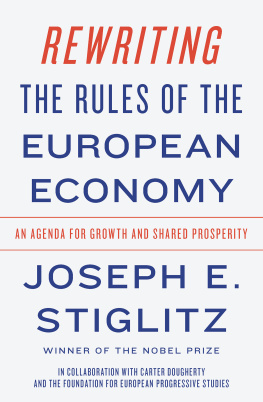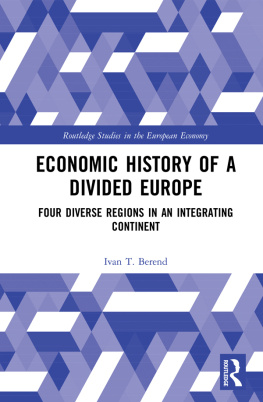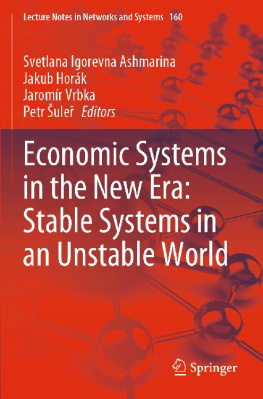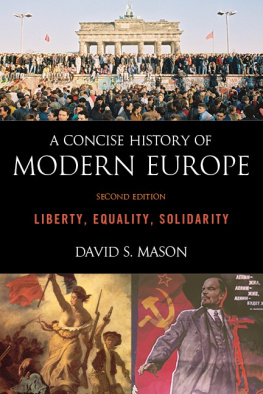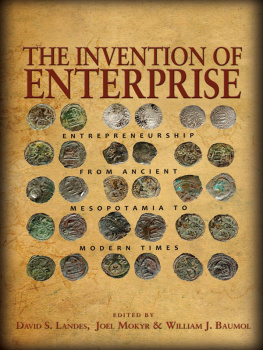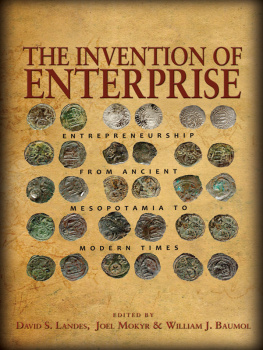
Case Studies on Modern
European Economy
The last two centuries have been the scene of dramatic change throughout Europe. And one of the main causes of these tremendous and spectacular changes was the economy. These transformations were achieved by peoplescientists and political thinkers, inventors and entrepreneurs, educators, skilled and educated workerswho not only invented machines and computers, but were able to renew economic and political systems. This volume, therefore, presents a new approach to the period by looking at case studies to understand how these changes came about and the impact they had on modern Europe.
Ivan T. Berend presents the spectacular history of modern European economy as a chain of small events, actions, and the ideas of individuals, as the influence of institutions and bold entrepreneurs. The essays are grouped into six chapters and discuss the power of entrepreneurship; the power of institutions; economic regimes and the permanent renewal of capitalism; the power of ideas and inventions; pioneering companies; from the rise of industrial cities to post-industrial suburbanization; and bubbles, great depressions, and economic cycles. All of the single episodes and personal stories offer a cross-section of the complex and interrelated history of modern Europe.
Case Studies on Modern European Economy will be essential reading for students of economic and modern European history.
Ivan T. Berend is a professor in the history department at the University of California, Los Angeles. His publications include An Economic History of Nineteenth-Century Europe: Diversity and Industrialization (2013), Europe Since 1980 (2010), From the Soviet Bloc to the European Union (2009), An Economic History of Twentieth-Century Europe (2006) and History Derailed (2003).
Case Studies on Modern
European Economy
Entrepreneurs, Inventions, Institutions
Ivan T. Berend
First published 2013
by Routledge
2 Park Square, Milton Park, Abingdon, Oxon OX14 4RN
Simultaneously published in the USA and Canada by Routledge
711 Third Avenue, New York, NY 10017
Routledge is an imprint of the Taylor & Francis Group, an informa business
2013 Ivan T. Berend
The right of Ivan T. Berend to be identified as author of this work has been asserted by him in accordance with sections 77 and 78 of the Copyright, Designs and Patents Act 1988.
All rights reserved. No part of this book may be reprinted or reproduced or utilised in any form or by any electronic, mechanical, or other means, now known or hereafter invented, including photocopying and recording, or in any information storage or retrieval system, without permission in writing from the publishers.
Trademark notice: Product or corporate names may be trademarks or registered trademarks, and are used only for identification and explanation without intent to infringe.
British Library Cataloguing in Publication Data
A catalogue record for this book is available from the British Library
Library of Congress Cataloging in Publication Data
Berend, T. Ivn (Tibor Ivn), 1930-
Case studies on modern European economy : entrepreneurs, inventions,
institutions / Ivan T. Berend.
p. cm.
Europe Economic conditions. 2. Entrepreneurship Europe Case
studies. 3. Capitalism Europe Case studies. 4. Economic development
Europe Case studies. I. Title.
HC240.B3946 2013
330.94 dc23
2012039802
ISBN: 978-0-415-63994-1 (hbk)
ISBN: 978-0-415-63995-8 (pbk)
ISBN: 978-0-203-55040-3 (ebk)
Typeset in Times
by Taylor & Francis Books
To Kati as always
Contents
Preface
The idea to write this book emerged while I was working on my comprehensive European economic histories of the nineteenth and twentieth centuries. To break up their several hundred pages of macro-economic discussion, analyses, and statistical documentation, I added micro-economic illustrations in the form of short, easily readable, colorful case studies. Within three books I attached about three dozen case studies on topics such as the invention of the steam engine, the birth of department stores, pre-modern cultural-behavioral patterns and the lack of education in some peripheral countries. All were very well received by readers and reviewers alike.
Here I present a whole volume of case studiesa micro-historical illustration of macro-historical processes. The process of selecting roughly 70 examples from among thousands of possibilities is an unavoidably risky enterprise, not least because the choices may appear to be arbitrary. What criteria can be applied to structure choices? Which of the entrepreneurs, inventions, ideas, or companies are the most important in a more than 200-year-long history? The list might easily be almost endless. I have had to develop a rational framework to guide both the selection of cases and their presentation within this volume. What I offer here, although only a small sample, consists of cases typical, significant, and highly interesting, selected for their ability to illustrate six different topics and organized one chapter for each topic. My firm belief is that together my choices represent the factors most important in stimulating the development of the modern European economy.
The development of the modern economy occurred in conjunction with the emergence of the individualthe entrepreneuras a significant economic actor. So important was this change that Joseph Schumpeter, one of the greatest economists of the twentieth century, could imagine the entrepreneur as the hero of the capitalist market economy and the prime-mover of innovation. I introduce a group of exceptionally innovative entrepreneurs who left their fingerprints all over the modern European economy.
Entrepreneurs, however, always have had to work within institutional frameworks, and therefore Institutional systems, however, are not always working well. They are not always good to all of the players. Dissatisfaction and disappointment often led to changes, reforms, or even revolutions. When nineteenth-century free market capitalism failed to produce the imagined and desired outcome for the peripheral countries of Europe, revolutions after World War I introduced alternative economic regimes. Both right- and left-wing alternatives failed. Systemic competition, however, especially during the Cold War half-century, generated reforms and capitalism renewed itself.
The case studies in dig deeper into the causes of institutional and systemic change by discussing certain revolutionary ideas and inventionscultural and scientific factorsthat played central roles in both societal and economic development. Broad cultural movements such as the Enlightenment and Romanticism, as well as the works of individuals such as Newton and Darwin shaped the modern way of thinking, institution creation, and economic transformation. Scientific and technological inventions provided a foundation for economic innovation and company formation during the great economic revolutions: the late-eighteenth-century first and turn-of-the-twentieth-century second industrial revolutions, and the turn-of-the-twenty-first-century communications revolution. Case studies on these topics reflect their central role in transforming human life.


